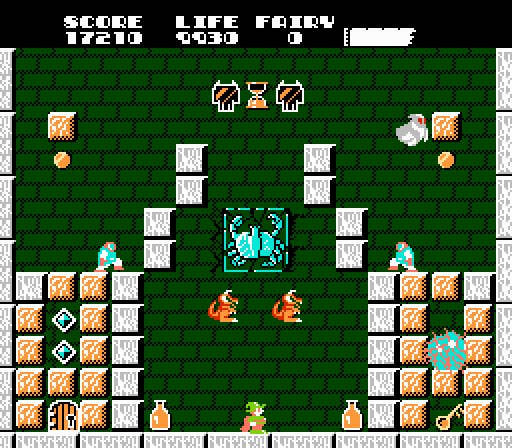Virtual Spotlight: Solomon's Key
A classic puzzle platformer that simply begs for conquest in the new age of save states.
This article first appeared on USgamer, a partner publication of VG247. Some content, such as this article, has been migrated to VG247 for posterity after USgamer's closure - but it has not been edited or further vetted by the VG247 team.
The puzzle platformer once thrived, then vanished, and has begun burgeoning once again thanks to the advent of digital platforms. Life finds a way, you know?
Back in the day, though, we didn't really differentiate between platformers and their puzzle offshoots. When Solomon's Key entered the world, Super Mario Bros. and the scrolling mayhem it unleashed upon the world was still a new and fantastic invention. Arcade games often took place on single-screens -- "boards," we called them back then, without irony -- and focused on denser, more precise forms of action than we expect now. When all you have is a single screen to maneuver in, you have to make every pixel count.

It's actually kind of shocking to think Solomon's Key got its start in the arcade, because it consists of dozens of puzzle screens of increasing complexity. Towards the end, the difficulty level is downright staggering. Was there anyone truly masochistic enough to complete this game in its original coin-op format? I can only imagine some sad sack sitting in a dim arcade, dropping quarter after quarter into the machine for days on end. At long last, he sees the ending screen. Blearily, he steps out of the arcade and crumbles into dust as the sun's mighty rays disintegrate his body.
Thank goodness for Virtual Console. Now we can challenge Solomon's Quest without risking our lives. There's no shame in using save states. God put 'em there for a reason, after all.
Solomon's Key, like all the best action puzzlers, is simplicity incarnate. Protagonist Dana can perform only a few limited actions: Walk, jump, and create or destroy blocks. There's a little nuance to his abilities in that you can direct his actions somewhat, and nudging him over to stand on the edge of a block extends his range. Ultimately, though, the complexity of the game comes through the puzzle design, not through the controls or interface.
You can master all of Dana's basic moves in the first stage. However, you'll be finding new applications for them all the way to the end of the game. At the most basic level, you create stepping stones to reach distant ledges, or to block roaming monsters. But then you'll get to points where you have to create and destroy stair steps in a certain order, or find ways to manipulate the movement of enemies, or even destroy the ground you're walking on in order to advance.
But hey, why just read about it when you can see the whole grueling experience for yourself, as conveyed by a charming Japanese comedian who kind of sucks at video games?
Game Center CX S2 06 - Solomon's Key by GamingCX
Like a lot of early NES games, Solomon's Key is just begging for reconsideration by history. Its primitive graphics and simple action belie an awful lot of depth and some excellent game design. While it has its hair-pulling moments of frustration (though knowing about the secret continue feature goes a long way toward mitigating this), by and large Solomon's Key consists of several dozen deviously designed stages that will keep a puzzle fan up late at night trying to crack their riddles. Or, you know, you could just watch that episode of Game Center CX and spoil it for yourself.
ConclusionA pleasant gem from the early days of the NES, Solomon's Key holds its own against just about any modern-day puzzle platformer you care to name. Don't let the dated graphics throw you; this game arranges its minimal components in devious ways.
